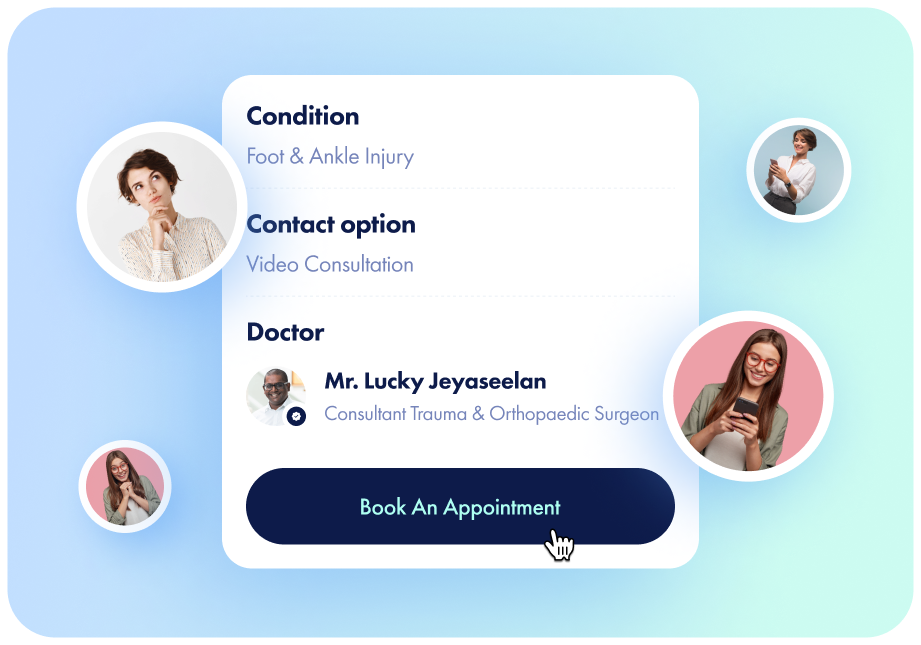
Conveniently reserve your spot with just a few clicks through our easy-to-use online booking system.


Hypertension, also known as high blood pressure, is a common condition where the force of blood pushing against your artery walls is consistently too high. This can happen for various reasons, and often doesn't cause any noticeable symptoms. However, left untreated, high blood pressure can increase your risk of serious health problems like heart disease, stroke, and kidney failure. Early detection and management are key to preventing these complications and maintaining good health.
You are not required to provide a referral letter from your doctor or GP.
Start a visit quickly and discreetly whenever works best for you.
Our doctors review symptoms, prescribe treatments if needed.
Proceed with your healthcare journey as you wish. You're in control.
You control medical records, access anytime.
Most people with up to stage 2 hypertension do not experience any symptoms. Oftentimes, high blood pressure only becomes apparent after a sphygmomanometer test. However, people with severe hypertension (180/120 mm Hg or higher) may exhibit the following symptoms during a hypertensive crisis:
Headaches
Chest pain (angina)
Shortness of breath
Irregular heart rhythm (arrhythmia)
Blurred vision
Buzzing in one or both ears
Nosebleeds
Confusion
Nausea
Dizziness, weakness, or fatigue
Сontact us to schedule an appointment or learn more
Conveniently reserve your spot with just a few clicks through our easy-to-use online booking system.
Have a question or request? Drop us a message, and our team will get back to you promptly.
Feel free to give us a call, and our friendly staff will be glad to assist you over the phone.
All your organs, including the blood vessels and the heart, function best at an ideal blood pressure range (between 90/60mm Hg and 120/80mm Hg). Unmanaged hypertension gradually damages critical organs, such as the heart, brain, and kidneys, leading to life-long health complications or catastrophic organ failure.
High blood pressure is often described as the “silent killer” because, by the time the associated complications become noticeable, it’s often too late. In the UK, the death rate from hypertension stands at 62.6 deaths per 100,000 people.
Hypertension can lead to the following health complications
Stroke
Hypertension is the main cause of cerebral haemorrhage stroke. This is a lethal kind of stroke that happens when a blood vessel inside the skull busts (due to extreme blood pressure) and bleeds into the brain.
Cardiovascular disease
The extra stress high blood pressure puts on the circulatory system can lead to cardiovascular illnesses such as peripheral artery disease, coronary artery disease, and coronary heart disease. Such illnesses increase the risk of heart failure and cardiac arrests.
Kidney failure
The kidneys contain tiny blood vessels known as peritubular capillaries that filter waste from blood. If the blood pressure is too high, it can damage these delicate capillaries, stopping the kidneys from working properly.
Aneurysm
An aneurysm is an abnormal bulge or ballooning in the walls of a blood vessel. The swelling normally occurs where arterial walls are weak, mostly in the aorta, brain, spleen, intestines, or back of the knee. If the blood pressure is too high, the aneurysm can rupture, causing potentially fatal internal bleeding.
Diabetes
High blood pressure interferes with glucose metabolism in the body. Ultimately, it impairs glucose tolerance and increases insulin resistance, leading to type 2 diabetes. Also, having diabetes increases the risk and development of hypertension. So, the two conditions often occur together in a positive feedback loop.
Vision loss
Hypertension can damage the retina’s microvasculature (network of capillaries), causing vision problems or permanent vision loss. The condition is known as hypertensive retinopathy.
Sexual dysfunction
High blood pressure can damage the wall lining of blood vessels, causing them to harden and narrow (atherosclerosis). This limits blood flow in the penis, leading to erectile dysfunction in men. Also, high blood pressure lowers libido in women.
From Home or Face to Face, all at your convenience
Schedule a Video Consultation or a Face-to-Face appointment at your convenience by using our online booking system.
Speak with a Specialist
Schedule a Video Consultation or a Face-to-Face appointment at your convenience by using our online booking system.
Get a Personalised Treatment Plan
Your dedicated Specialist Doctor will provide you with personalized treatment, tailoring it to your specific needs, and may include necessary medication.
The exact cause of high blood pressure is unknown. But through decades of hypertension case studies, researchers have come up with a list of factors that increase the risk of developing high blood pressure:
Being overweight or obese
Having diabetes
Smoking
Drinking too much alcohol and coffee
Being chronically depressed, stressed, or anxious
Being over the age of 65
Leading a sedentary lifestyle
Consuming too much salt
Being pregnant
A family history of hypertension or other cardiovascular conditions
Taking certain medications
The exact cause of high blood pressure is unknown. But through decades of hypertension case studies, researchers have come up with a list of factors that increase the risk of developing high blood pressure:
Being overweight or obese
Having diabetes
Smoking
Drinking too much alcohol and coffee
Being chronically depressed, stressed, or anxious
Being over the age of 65
Leading a sedentary lifestyle
Consuming too much salt
Being pregnant
A family history of hypertension or other cardiovascular conditions
Taking certain medications










